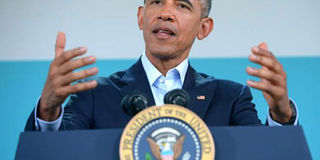Battle lines drawn over Supreme Court post

US President Barack Obama speaks during a press conference following a meeting of the Association of Southeast Asian Nations (ASEAN) at the Sunnylands estate on February 16, 2016 in Rancho Mirage, California. Mr Obama says he intends to put forward a Supreme Court candidate with impeccable legal credentials. PHOTO | AFP
What you need to know:
- Both sides dug in hard this week over replacing Antonin Scalia, the conservative justice who died unexpectedly February 13 at the age of 79.
- Under the US Constitution, the president nominates judges for the lifetime position at the nation’s highest court, and it is up to the Senate to approve or reject his choice.
WASHINGTON
The battle lines have been drawn between President Barack Obama and Republican rivals in the Senate over filling a tie-breaking vacancy on the Supreme Court.
Both sides dug in hard this week over replacing Antonin Scalia, the conservative justice who died unexpectedly February 13 at the age of 79.
Republicans in the Senate, which must approve any nomination, say that whoever is elected president in the November 8 presidential election should choose the new justice, while Obama says it is his constitutional duty to act now and pick a nominee.
Under the US Constitution, the president nominates judges for the lifetime position at the nation’s highest court, and it is up to the Senate to approve or reject his choice.
Mr Obama says he intends to put forward a candidate with impeccable legal credentials and that the Senate should perform its constitutional role of advice and consent, and not let politics stand in the way.
But Senate Majority leader Mitch McConnell says Republicans on the Judiciary Committee will not even meet with any appointee announced by the president, much less hold confirmation hearings or send the nomination to the Senate floor for a vote.
The two sides are refusing to budge because much is at stake: the Supreme Court’s decisions shape American life to a large extent, and with Scalia gone the court is now evenly divided 4-4 between conservatives and progressives.
Conservatives fear Obama might name another liberal to tip the balance of what had been a conservative court when Scalia sat on the bench.
NOT YOUR PLACE
The main Republican candidates for the presidency — Donald Trump, Ted Cruz and Marco Rubio — contend that tradition holds that an outgoing president abstains from naming Supreme Court nominees in an election year, like this one.
There have been exceptions, however, and in any event election year vacancies on the high court have been rare events.
Mr Rubio has even called Mr Obama a lame duck president, the derogatory term for a chief executive whose days are numbered late in his second term and can do little but manage the day to day runnings of government but make no major policy decisions.
But that characterization is wrong, said Melissa Hart, a law professor at the University of Colorador at Boulder.
“The notion that President Obama is a lame duck president is simply incorrect. A lame duck president is a president whose successor has been elected. President Obama’s successor will not be elected for nine more months,” she said.
What can Obama do to dodge the Senate blockade?
First, he can hope for a crack in the “no to any candidate” front, which does not sit well with moderates in the Republican Party or with voters.





